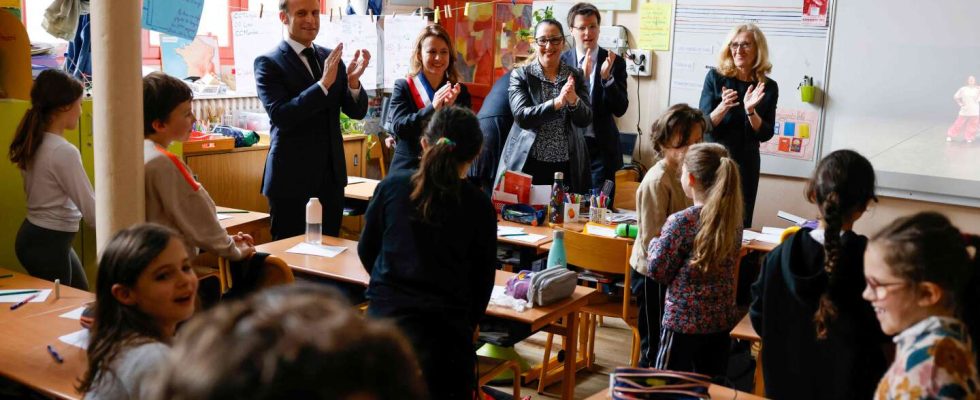While the Prime Minister, Gabriel Attal, declared that he was taking with him “the cause of the school in Matignon”the President of the Republic, Emmanuel Macron, visited Friday April 5 at the Parisian Blanche school (9e district), intends to show that he maintains control over this subject, established as one of the great causes of his second five-year term.
“This trip is a continuation of the course set by the President of the Republic to change the face of our public schooldetailed the Elysée. A transformation that he wishes to pursue for a school of demanding knowledge, a school of learning civics and authority and an active school which ensures the well-being and emancipation of everyone. »
The Head of State spoke with an autism elementary education unit (UEEA) class, then visited the LAB9A, an academic training laboratory aimed at better inclusion of students with autistic disorders, located in the same establishment . On this occasion, he took the opportunity to confirm the implementation of the reform of primary school teacher training, announced more than a year ago and the details of which were awaited. “We are going to open licenses to prepare for school teaching from the next school year”said the president, for whom the objective is twofold: to increase the quality of training, but also to strengthen the attractiveness of this profession in order to respond to the recruitment crisis.
“Normal schools of the 21st centurye century “
“ We will then give direct access to a master’s degree. And we are going to make our masters the normal schools of the 21ste century. There, the idea is that we will have people who will enroll from post-baccalaureate, we will train them straight away in basic learning and then [on aura] a very professionalized M1, M2 who will be paid “, did he declare. In master 1, students will have the status of student civil servant and will be paid 1,400 euros net, in the second year of master, they will have the status of trainee civil servant and will be paid 1,800 euros net, detailed later the Elysium.
Later, in front of the press, the head of state confirmed that the competition would take place “at the end of the license”, at bac + 3 level, rather than at master level today. Future secondary school teachers will also be affected by a competition at the end of the license. The Elysée also specified that the texts relating to this reform would be ratified by the spring and that the first licenses would see the light of day at the start of the 2025 school year.
The reform is consistent with that presented in the ministry’s working document entitled “The normal schools of the 21ste century. Training and recruitment strategy for future teachers”, which planned to bring forward the competitions to the end of the third year of the license for future school teachers (first level) and those of middle and high schools (second level). This project thus challenges the 2022 reform, decided under Mr. Macron’s first five-year term, which had moved the tests from the end of the first year of the master’s degree to the end of the second year. Validation of the bac + 5 diploma would remain necessary to become a holder.
At the end of the presidential visit, the Elysée announced an additional 98 million euros for the teaching pact, from the next school year, while 750 million had already been planned for 2024, confirming information from Parisian. The “pact”, the implementation of which was laborious at the start of the 2023 school year, materializes in the form of envelopes to be distributed among volunteer teachers, in each establishment, to remunerate a range of additional missions, such as short-term replacements. , support for students who have dropped out of vocational high schools or even the conduct of “innovative projects”…
“The school must remain a sanctuary”
During this trip, securing the surroundings of establishments was also discussed. This question returned to the center of concerns this week, following two attacks: that of Samara, 13, severely beaten as she left her school in Montpellier, on April 2, and that of a 15-year-old schoolboy. years old, taken to hospital in absolute emergency on Thursday April 4 in the evening after being beaten up by several people while he was returning home after classes, in Viry-Châtillon (Essonne).
The World Workshops
Online courses, evening classes, workshops: develop your skills
Discover
“We are intractable and we will continue to be. School must remain a sanctuary for our children, their families and teachers. This is why the minister announced a plan to strengthen security resources” for establishments, declared the president, referring to the meeting the day before, bringing together academy rectors, prefects and prosecutors, Place Beauvau, in the presence of the ministers of the interior, justice and National Education. During this, the government notably confirmed the creation of a mobile national security team, announced on March 29 by Nicole Belloubet, and the launch of a “educational support network”which would consist of deploying education assistants (AED) to help secure schools and secondary establishments.
The Head of State also recalled that the government was committed to the fight against online harassment, through the training of teachers and work on “platform responsibility”. He also clarified his wish to strengthen the“support and empowerment of families”. Finally, he set out measures, already mentioned by Gabriel Attal during his general policy speech on January 30, such as the proposal made to the families of “placing difficult children” in boarding school.

